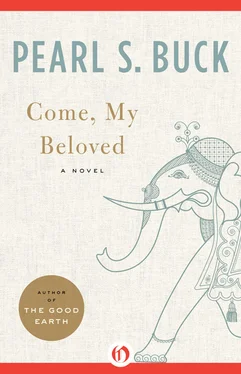Why shouldn’t he make his own missionaries and send them to India?
At Poona Wahdi settled them in a good hotel, but MacArd was restless, and he set out to see the city at once, though the afternoon was late. David did not come with him. He had met in London at Claridge’s a young Indian, Darya Sapru, and this young man had invited David to his home if he came to Poona, and there David decided to go. Meanwhile MacArd wandered about the streets at his usual swift pace, startling the people who fell back before him, fearful of his size and good garments. The big idea was with him now day and night and everything he saw was subject to it and became part of it. Here in Poona he found two rivers joining to wind themselves like sluggish serpents among the houses. Behind the city the hills rose to a high tableland and upon one of those hills, his guidebook told him, was an ancient aqueduct, built long ago by a Marathi family. Its source was in a well. Water there was close to the surface of the earth. It would be easy to send it over the whole region, and the land need not lie barren until the monsoons brought rain.
He went back to the hotel at nightfall, and his idea was beginning to grow like a tree. It stretched down roots and sent out branches. He would train his young men and send them here to do his work. There must be a place to train them, a great school, an institution endowed — why not in the name of his beloved wife? That would be an immortality in itself, the Leila MacArd Memorial—
He opened the door of their rooms and found his son waiting and excited by his own afternoon.
“It was a wonderful house, Father,” he exclaimed, “the most extraordinary gardens along the river. I’ve never seen such a place — marble floors in all the main rooms and a huge separate dining room connected with the house by a long passageway, lovely in itself. There’s another huge room — open, too, the sides all carved in wood — where Darya says the family really lives. The drawing room had the handsomest ceiling I’ve ever seen, all done by Poona artists.”
MacArd said absently, “A contrast to the rest of India, I should say.”
His son looked at him with a peculiar humor in his mild dark eyes, but he did not notice it. The conversation died, nor was it resumed for the next few days while they came and went.
Poona was more easily traveled than Bombay, a large city divided into parts like wards, and spotted by the usual monuments and bridges erected by rich Indians. By the fifth day MacArd was ready to go beyond into the surrounding countryside. He was thinking furiously now about water, and how it alone might change the face of India. He saw a country threaded by silver canals, a network of irrigation, independent of rains or even of rivers. Let them use the Mutha and the Mula rivers here in Poona and the Ganges itself in the northeast for electric power, but irrigation canals, the water drawn deep from the earth, alone could provide the steady lifegiving stream to the plains.
Yet who could do it except the Indians themselves? The resignation of the poor and the selfishness of the rich must be blasted by new force. The merchants, the wealthy princes, were willing enough to make vast buildings and public monuments, but they did nothing to relieve the poverty of the hopeless peasants. What they needed was a new religion, a practical religion, that built irrigation systems and railroads as well as churches. He would send a new kind of Christian here, a man who worked while he preached.
On that fifth day he made his decision, and it came from a peasant, a Hindu, naked except for the white turban about his head and the scrap of white cotton about his loins, a thin dried man of about fifty, but one could never tell the ages of men and women here, and probably he was only twenty or twenty-five. The man was a potter, such a potter as any Indian village may have and MacArd was walking with only Wahdi, for David was again with Darya. He came upon the potter as he crouched upon the dusty floor of earth, running with his foot his potter’s wheel while his narrow graceful hands, the fingers supple and swift, shaped a mass of whirling clay. He had looked up to smile fearfully at MacArd, a foreigner and a white man, and to Wahdi he made his excuse that at this moment he dared not rise to give proper greeting, lest the vessel be spoiled.
“Tell him I want to see what he is making,” MacArd ordered, and Wahdi translated with the distaste he always showed when he spoke to a Hindu.
The vessel was finished in a few minutes, a common bowl of clay made from the dry dust of the fields mingled with a little precious water, and the potter set it to dry in the burning sun.
“Ask him if he will take time to show me the village and the fields,” MacArd said to Wahdi. “Tell him I will pay him.”
This in turn was translated, the man nodded, his face lit with a bright good humor, and stepping carefully ahead of MacArd he led him about the small collection of mud huts from which men stood and stared and in which the women hid. The children ran everywhere naked and grey with the dust.
But it was in the fields that MacArd saw the strange sight which persuaded him, like a vision, to the determination which was thereafter to shape his life. The potter was some twenty feet ahead of him upon the narrow path between the fields when suddenly a serpent lay across the path, a cobra, as MacArd instantly recognized. He had not seen one before, except in the pictures of this guidebook, but there could be no mistaking the raised and hideous head flattening and spreading out with fright and rage. Wahdi leaped away but MacArd cried out, “Let me get him!”
He raised his cane, a heavy malacca stick tipped with metal.
The potter shook his head and would not let him pass. He had stopped only a few feet from the cobra and now he stood motionless. He raised his hands and placed them palm to palm, touching his forehead with the tips of his fingers. The cobra swayed back and forth in ever diminishing waves of motion, his sickening head resumed its natural shape and while the potter waited in the attitude of prayer, the cobra gradually subsided, uncoiled its stubborn length, and crawled away.
The potter waited until it had disappeared into a wide crack in the field and then he turned to MacArd. Wahdi was creeping back again, seeing safety, and the potter spoke to him.
“He tells, Sahib,” Wahdi said in some scorn, “he tells that the snake is a god. It is sin to kill a god.”
MacArd was repelled to the soul. This, then, was why poisonous snakes abounded in the vile soil, and this was why they could not be destroyed!
He turned abruptly from the potter. “I will go back to Poona now,” he said to Wahdi. “Pay this man something.”
All the way back to Poona he kept seeing the flattened devilish head of the snake, and between him and it the slender graceful figure of the potter, a good man as even he could see, but one who did not dare to kill the snake, the curse, the menace even to his own life, because of his religion.
MacArd strode into his hotel bedroom and forbade Wahdi to come in.
“I want to rest,” he told Wahdi. “Go away, amuse yourself, eat a meal, anything you wish.”
“Yes, Sahib,” Wahdi said. He was used now to this harsh American who was foolishly liberal with his money. He went away complacent over his own superior common sense and MacArd sat down in a wicker chair. David was not back and he was alone in the room.
Religion! Was that religion, being willing to wait for a snake to strike, passive and waiting, no protest, no self-defense? No wonder the people sat upon the barren land, waiting for the rains.
He struck his big clenched fist on the bamboo arm of the chair. He would put an end to it.
The vision rose before his eyes. The dry land would grow green, the hungry would be fed, the poor would be rich. And he would go to heaven, at last.
Читать дальше












